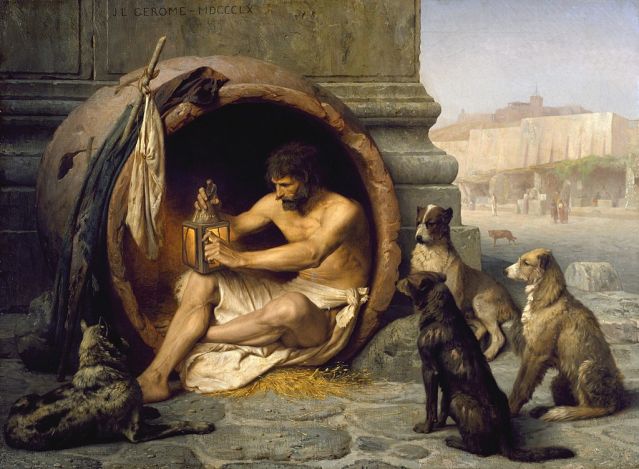Ethics and Morality
The Surprising Benefits of Self-Imposed Hardship
Why the Stoics, like their ancestors the Cynics, greatly valued hardship.
Updated June 26, 2024 Reviewed by Devon Frye
Key points
- According to the Stoics, we should routinely practice poverty or put ourselves through mild hardship.
- Self-imposed hardship can help us discover what we can do without, and reduce our fear of losing those things.
- It can also remind us that simple things, such as bread and olive oil, can be just as enjoyable as any luxury.

After being exiled from his native Sinope for having defaced its coinage, Diogenes the Cynic moved to Athens, took up the life of a beggar, and made it his mission to metaphorically deface the coinage of custom and convention—which, he maintained, was the false currency of morality.
Diogenes disdained the need for conventional shelter and other corrupting “dainties” and chose instead to live in a storage jar and survive on a diet of chickpeas and lupins. He used to beg for the bare necessities, including from statues—saying that he was thereby practising for rejection. He held that human beings had much to learn from the simplicity and artlessness of dogs, which, unlike human beings, had not “complicated every simple gift of the gods.” The term “Cynic” possibly derives from the Greek for “dog-like,” kynikos.
In the deep winter, Diogenes would strip naked and embrace bronze statues. One day, upon seeing this, a Spartan asked him whether he was cold. When he said that he was not, the Spartan replied, “Well, then, what’s so impressive about what you’re doing?”
Enter the Stoics
Like their ancestors the Cynics, and like the Spartans, the Stoics greatly valued hardship, albeit it on a more modest or moderate scale. We should, they said, routinely practice poverty or put ourselves through mild hardship, and this for several reasons.
First, to discover what we can do without, and reduce our fear of losing these things. In his Letters, Seneca advises Lucilius: “Set yourself a period of some days in which you will be content with very small amounts of food, and the cheapest kinds, and with coarse clothing, and say to yourself, 'Is this what I was afraid of?'”
Second, to be reminded that simple things, such as bread and olive oil, or a good night’s sleep, can be just as enjoyable and profitable as any great banquet, and thus that pleasure is both easily available and highly transferable.
Third, to better reflect upon our true goals, or to work towards them. “If you want to have time for your mind,” says Seneca, “you must either be poor or resemble the poor… One cannot study without frugality, and frugality is just voluntary poverty.”
Here are six more benefits of self-imposed hardship, according to the Stoics:
- To increase our appreciation and enjoyment of the things that we normally enjoy.
- To break from our normal routine, and reinvigorate our minds while exercising and reinforcing our freedom.
- To be prepared for future hardship, which, unless we are suddenly struck dead, is all but a certainty.
- To be convinced that the greater part of our suffering lies not in fact but in our attitude towards it.
- To practise self-discipline, or test our Stoicism.
- To empathize with less fortunate people, and people from the past.
In addition, self-imposed poverty and hardship can also have more mundane benefits, such as losing weight, or saving time or money.
Finally, all the reasons so far enumerated are themselves a source of pride, and pleasure of a different kind. “Do not” says Marcus Aurelius, “lament misfortune. Instead, rejoice that you are the sort of person who can undergo misfortune without letting it upset you.”
Seneca does us the favour of putting self-imposed hardship into radical perspective when he says: “Armies have endured being deprived of everything for another person’s domination, so who will hesitate to put up with poverty when the aim is to liberate the mind from fits of madness?”
Read more in Stoic Stories.
References
Seneca, Letters to Lucilius, Letter 18.
Seneca, Letters to Lucilius, Letter 17.
Marcus Aurelius, Meditations, IV, 49.
Seneca, Letters to Lucilius, Letter 17.


